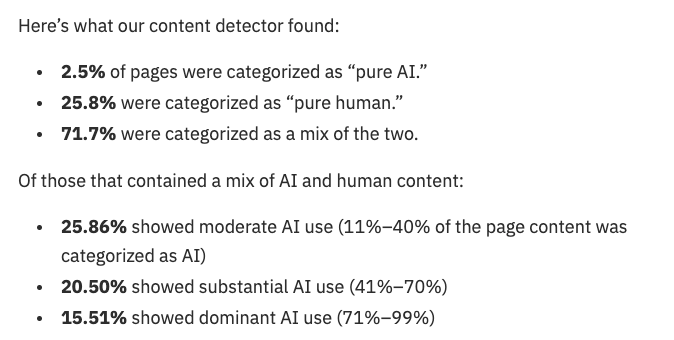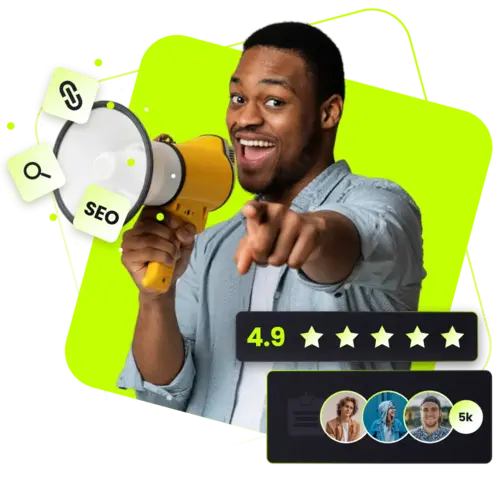AI content is rife right now.
An claims that 74% of new webpages included AI content.
That’s massive, clearly.
So, the use of AI content – both in general and specifically for SEO – seems pretty open and shut then, right?
Find some keywords, lump them together into a brief for AI, ask it to create a blog post stitching them together and voila – an SEO content strategy.
Easy.
Well, not so fast little lemming. I’m sure your mother would have a lot to say about following friends jumping off cliffs…

Is AI Content Good For SEO?
The biggest question SEOs have is simply whether AI content is “good” for SEO (followed swiftly by the inverse: is it bad for SEO?)
Well, first things first, we need to acknowledge:
There are levels to this stuff.
To refer back to that Ahrefs study:

Only 2.5% of the pages they analyzed were “pure AI” content.
This tracks, as there’s certainly a stigma about using pure AI content in your webpages, blog posts etc.
For the purposes of this post, I’m taking “AI content” to be anything more than, say 60% AI-generated content at the point of publishing.
It straddles Ahrefs’ line between “substantial” and “dominant”. Why? Because it’s my post, and that’s what feels like a reasonable cut off point to me.
Does Google Say AI Content Is Bad For SEO?
No, actually. Sort of.

While it is likely they’ll continue to adopt nuance with their policy, we won’t assume they’re going to outright “ban” AI content any time soon.
So, AI Content Is Good For SEO, Right?
No – we can undo this with two remarkably simple “smell tests”.
1. If AI content were fine for SEO, there wouldn’t be a burgeoning market for AI content humanisers, especially ones targeted directly at SEO.
2. If AI content really was good for SEO, we wouldn’t all be asking this question – you wouldn’t be asking this question.
Oh that AI content writing you’re selling is great, is it? pic.twitter.com/QR8CfanwR4
— Daniel Trick (@DanTrickSEO) February 23, 2024
That nagging doubt? The inclination to check?
There’s a reason for that.
And there’s also data for that:
A Reboot Online experiment pitted AI-generated articles against human-written ones. The human-written pages ranked better, had lower bounce rates, and kept readers on-page longer.
Okay, So AI Content Is Bad For SEO?
AI content done badly is bad for SEO, in the same way that human content done badly is bad for SEO.
We can confidently state that pure AI content is bad for SEO.
Why? Because it’s bad for the user.
There is nothing wrong with using AI content or an AI outline as a baseline as long as you improve upon it.
As Lily Ray from Amsive puts it:
AI will always have a disadvantage to content legitimately created by humans: AI isn’t human. It doesn’t have first-hand experience and it never will. It doesn’t have real emotions or sentiments about the content it creates. Google will likely continue to focus more on the new E in E-E-A-T – Experience – because it cannot be replicated by AI. Only real content creators can demonstrate real-life experience, and Google knows how important those insights are to providing high-quality results.
The Summary: Is AI Content Good For SEO?
Here’s the robot-friendly summary: pure AI content is bad for SEO and users. AI content can be good for SEO if you supplement it with unique insights, data, and personal opinions.
Use AI to scale, sure. But don’t use it as a crutch.
It is not something you can churn out without editing or input and expect to perform well for SEO – or for readers.
Become a Pro at SEO
Join 65,000 others and learn the secrets to SEO success with our weekly blog posts.
